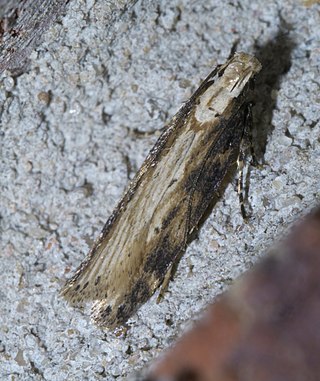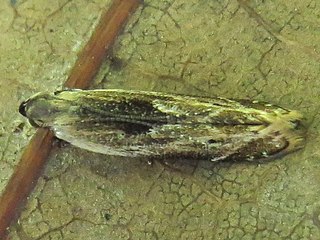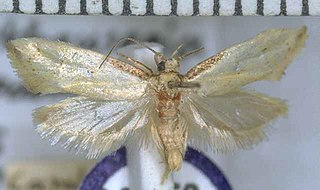Naera is a genus of moth in the family Gelechiidae. It contains the species Naera fuscocristatella, which is found in North America, where it has been recorded from Alabama, Kansas, Louisiana, Mississippi, Tennessee and Texas.

Phyllocnistis unipunctella is a moth of the family Gracillariidae. It is known from all of Europe.
Acrocercops lophonota is a moth of the family Gracillariidae. It is known from Java, Indonesia.
Helcystogramma scintillula is a moth in the family Gelechiidae. It was described by Walsingham in 1911. It is found in Mexico (Tabasco).

Chionodes hibiscella is a moth in the family Gelechiidae. It is found in North America, where it has been recorded from Connecticut and Illinois to South Carolina, Louisiana, Mississippi and Texas.
Arogalea senecta is a moth of the family Gelechiidae. It is found in Mexico (Guerrero).
Coleotechnites colubrinae is a moth of the family Gelechiidae. It is found in North America, where it has been recorded from Texas.
Pseudotelphusa belangerella is a moth of the family Gelechiidae. It is found in North America, where it has been recorded from Alberta, Maine and Kentucky.
Pseudotelphusa devia is a moth of the family Gelechiidae first described by Edward Meyrick in 1913. It is found in South Africa.
Pseudotelphusa oxychasta is a moth of the family Gelechiidae. It is found in Namibia, South Africa and Zimbabwe.
Symmetrischema loquax is a moth in the family Gelechiidae. It was described by Edward Meyrick in 1917. It is found in Peru.

Monochroa gilvolinella is a moth of the family Gelechiidae. It was described by James Brackenridge Clemens in 1863. It is found in North America, where it has been recorded from Illinois, Indiana, Mississippi, New Hampshire and Pennsylvania.
Ptocheuusa scholastica is a moth of the family Gelechiidae. It was described by Thomas de Grey, 6th Baron Walsingham in 1903. It is found in Spain.
Thiotricha pancratiastis is a moth of the family Gelechiidae. It was described by Edward Meyrick in 1921. It is found in Japan and Assam, India.
Taygete sylvicolella is a moth in the family Autostichidae. It was described by August Busck in 1903. It is found in North America, where it has been recorded from Illinois, Maine, New York, Ohio and South Carolina.
Antaeotricha trichonota is a species of moth of the family Depressariidae. It is found in Brazil and Paraguay.

Tingena apanthes is a species of moth in the family Oecophoridae. It is endemic to New Zealand and found on the North Island. The adults are on the wing from October to December. It appears associated with Leptospermum species and it has been hypothesised that the appearance of the adults of this species imitates faded Leptospermum leaves.

Tingena hemimochla is a species of moth in the family Oecophoridae. It is endemic to New Zealand and has been observed in the North Island. Adults of this species are on the wing from December until March.

Tingena letharga is a species of moth in the family Oecophoridae. It is endemic to New Zealand and has been observed in Otago. Adults are on the wing in December and January.

Trachypepla importuna is a moth of the family Oecophoridae first described by Edward Meyrick in 1914. It is endemic to New Zealand. Adults have been collected in the North Island in January but the species is regarded as being poorly known.






